Ethical and policy issues that affect the coordination of care for nursing homes Assignment 2022
VerifiedAdded on 2022/10/11
|13
|1117
|32
Presentation
AI Summary
Contribute Materials
Your contribution can guide someone’s learning journey. Share your
documents today.
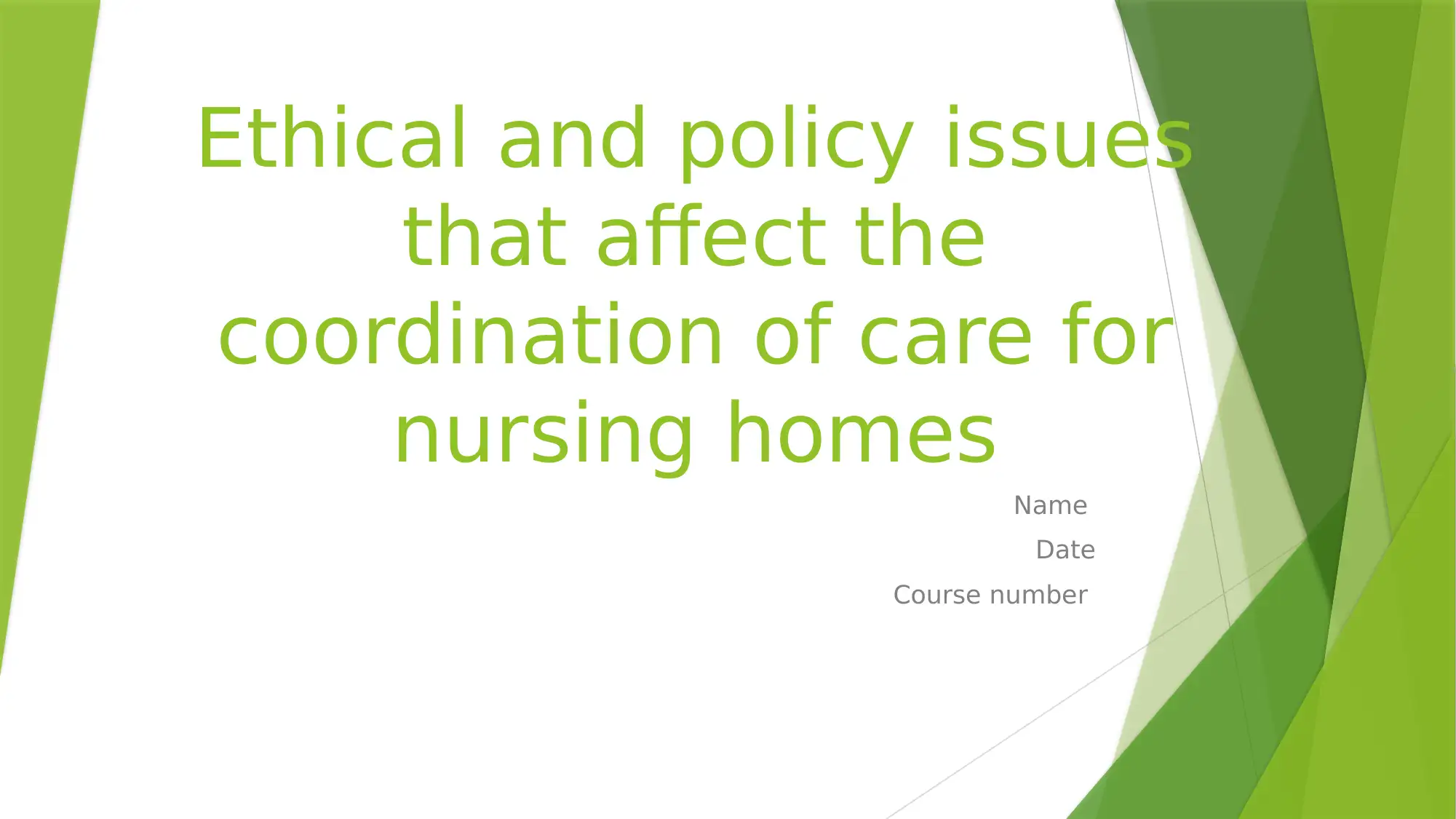
Ethical and policy issues
that affect the
coordination of care for
nursing homes Name
Date
Course number
that affect the
coordination of care for
nursing homes Name
Date
Course number
Secure Best Marks with AI Grader
Need help grading? Try our AI Grader for instant feedback on your assignments.
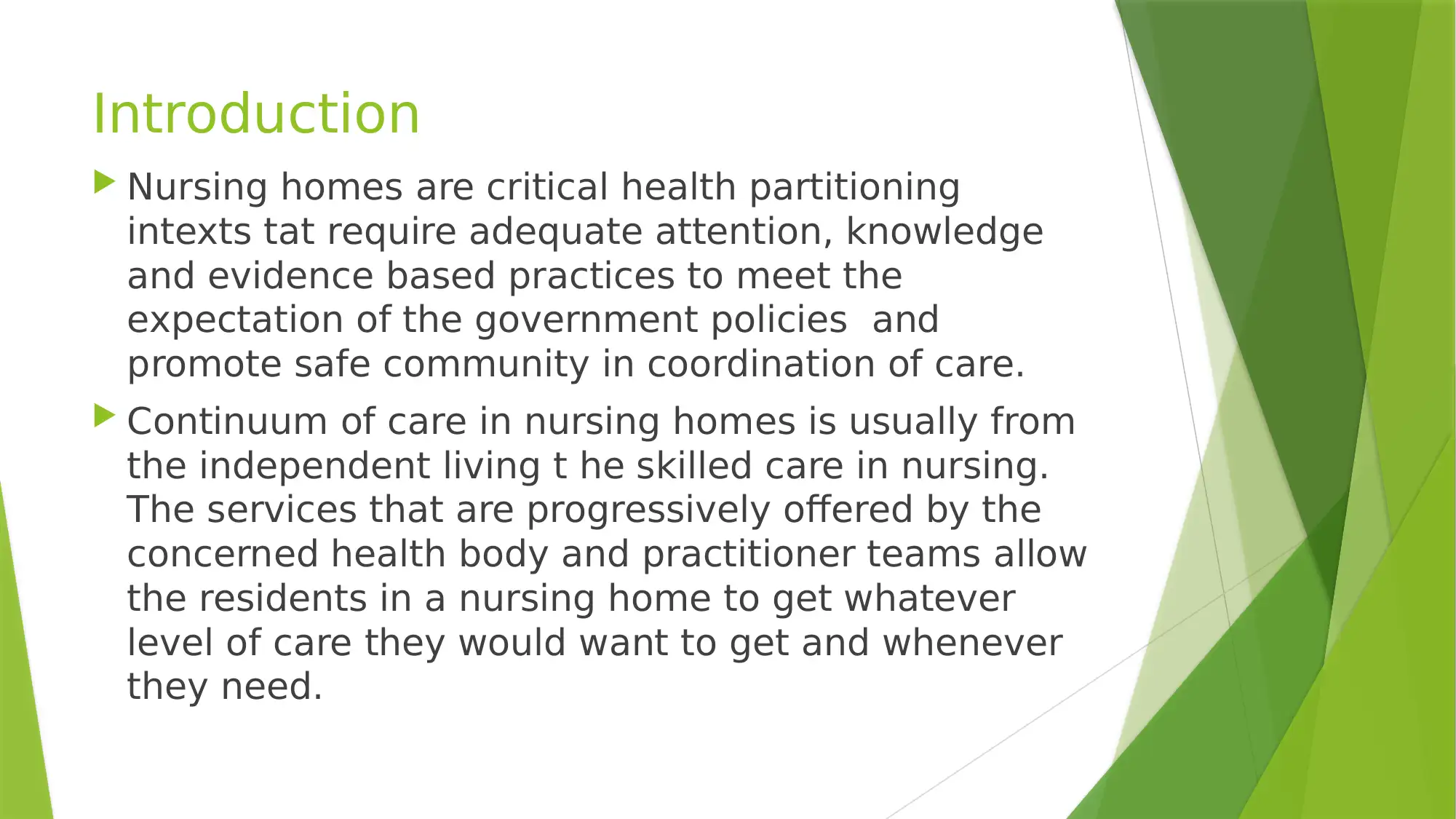
Introduction
Nursing homes are critical health partitioning
intexts tat require adequate attention, knowledge
and evidence based practices to meet the
expectation of the government policies and
promote safe community in coordination of care.
Continuum of care in nursing homes is usually from
the independent living t he skilled care in nursing.
The services that are progressively offered by the
concerned health body and practitioner teams allow
the residents in a nursing home to get whatever
level of care they would want to get and whenever
they need.
Nursing homes are critical health partitioning
intexts tat require adequate attention, knowledge
and evidence based practices to meet the
expectation of the government policies and
promote safe community in coordination of care.
Continuum of care in nursing homes is usually from
the independent living t he skilled care in nursing.
The services that are progressively offered by the
concerned health body and practitioner teams allow
the residents in a nursing home to get whatever
level of care they would want to get and whenever
they need.
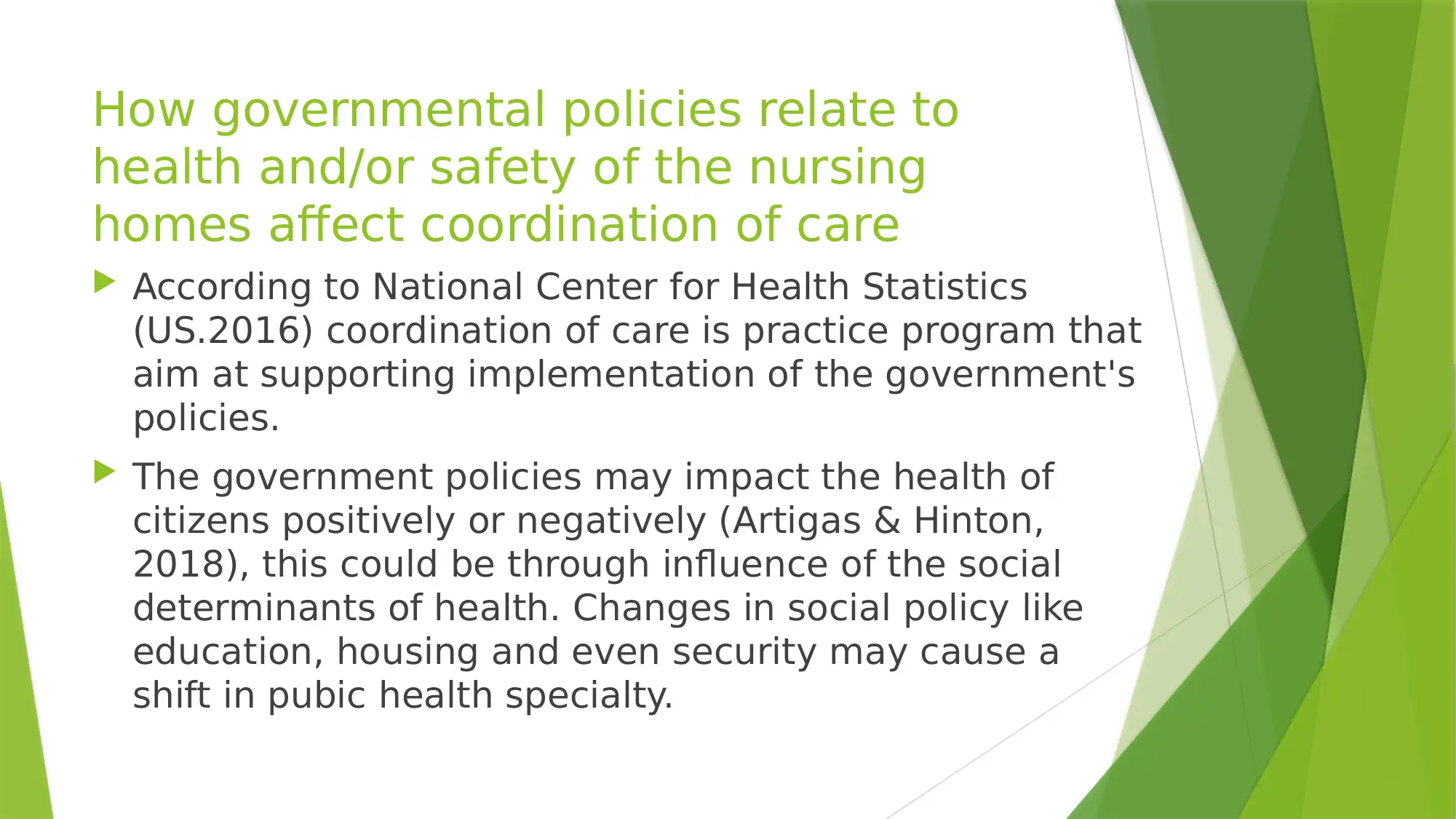
How governmental policies relate to
health and/or safety of the nursing
homes affect coordination of care
According to National Center for Health Statistics
(US.2016) coordination of care is practice program that
aim at supporting implementation of the government's
policies.
The government policies may impact the health of
citizens positively or negatively (Artigas & Hinton,
2018), this could be through influence of the social
determinants of health. Changes in social policy like
education, housing and even security may cause a
shift in pubic health specialty.
health and/or safety of the nursing
homes affect coordination of care
According to National Center for Health Statistics
(US.2016) coordination of care is practice program that
aim at supporting implementation of the government's
policies.
The government policies may impact the health of
citizens positively or negatively (Artigas & Hinton,
2018), this could be through influence of the social
determinants of health. Changes in social policy like
education, housing and even security may cause a
shift in pubic health specialty.
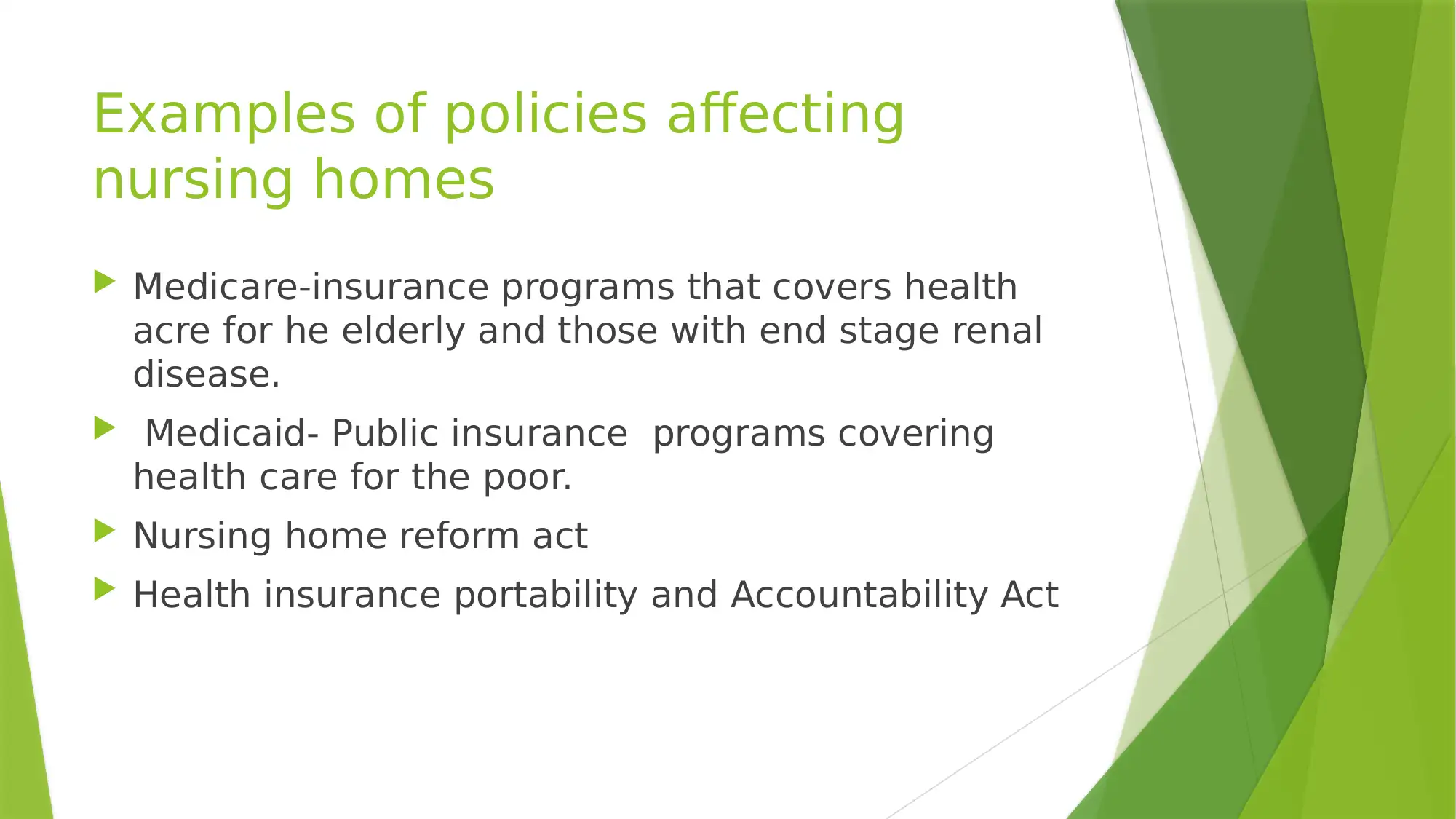
Examples of policies affecting
nursing homes
Medicare-insurance programs that covers health
acre for he elderly and those with end stage renal
disease.
Medicaid- Public insurance programs covering
health care for the poor.
Nursing home reform act
Health insurance portability and Accountability Act
nursing homes
Medicare-insurance programs that covers health
acre for he elderly and those with end stage renal
disease.
Medicaid- Public insurance programs covering
health care for the poor.
Nursing home reform act
Health insurance portability and Accountability Act
Secure Best Marks with AI Grader
Need help grading? Try our AI Grader for instant feedback on your assignments.
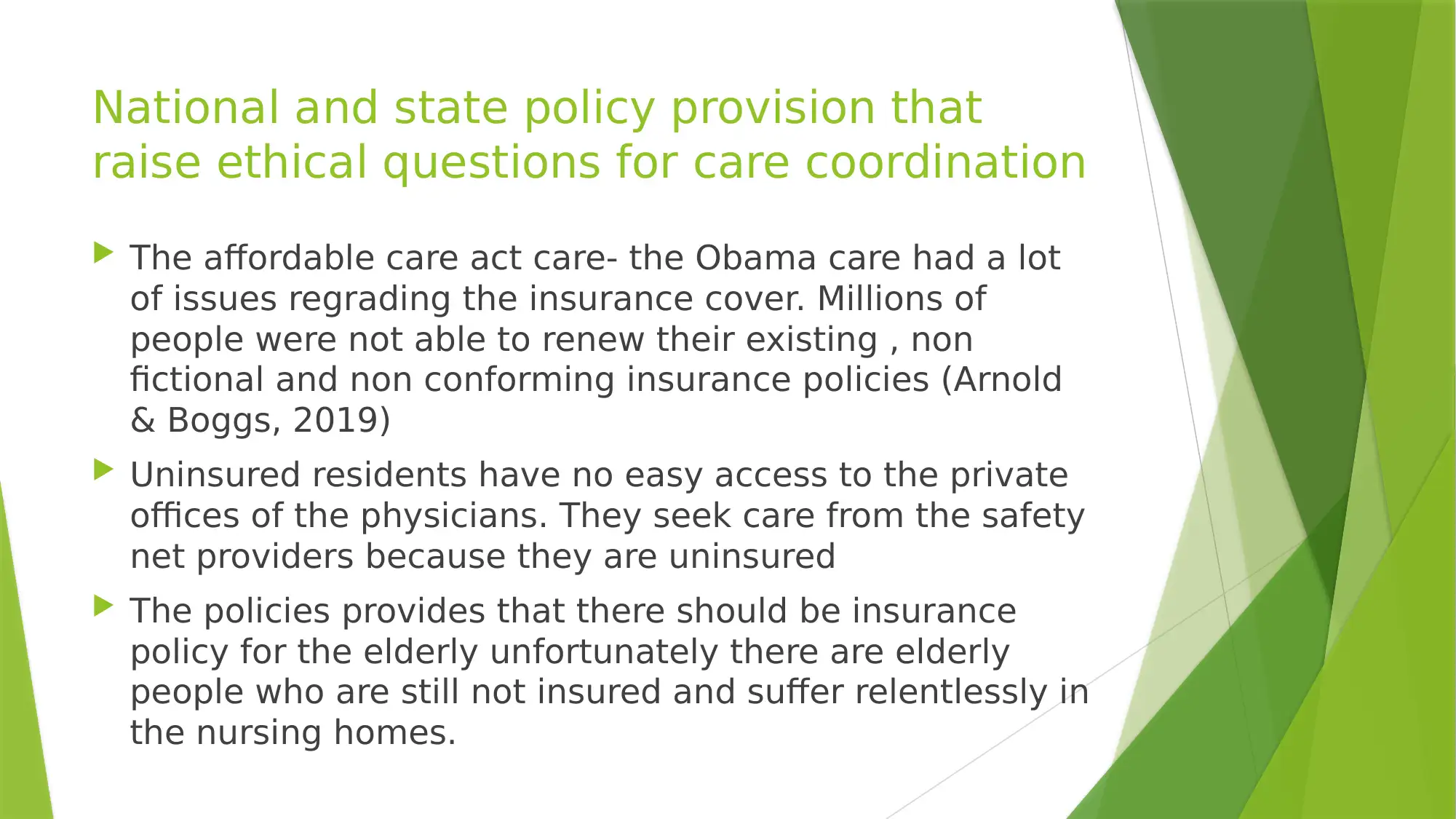
National and state policy provision that
raise ethical questions for care coordination
The affordable care act care- the Obama care had a lot
of issues regrading the insurance cover. Millions of
people were not able to renew their existing , non
fictional and non conforming insurance policies (Arnold
& Boggs, 2019)
Uninsured residents have no easy access to the private
offices of the physicians. They seek care from the safety
net providers because they are uninsured
The policies provides that there should be insurance
policy for the elderly unfortunately there are elderly
people who are still not insured and suffer relentlessly in
the nursing homes.
raise ethical questions for care coordination
The affordable care act care- the Obama care had a lot
of issues regrading the insurance cover. Millions of
people were not able to renew their existing , non
fictional and non conforming insurance policies (Arnold
& Boggs, 2019)
Uninsured residents have no easy access to the private
offices of the physicians. They seek care from the safety
net providers because they are uninsured
The policies provides that there should be insurance
policy for the elderly unfortunately there are elderly
people who are still not insured and suffer relentlessly in
the nursing homes.
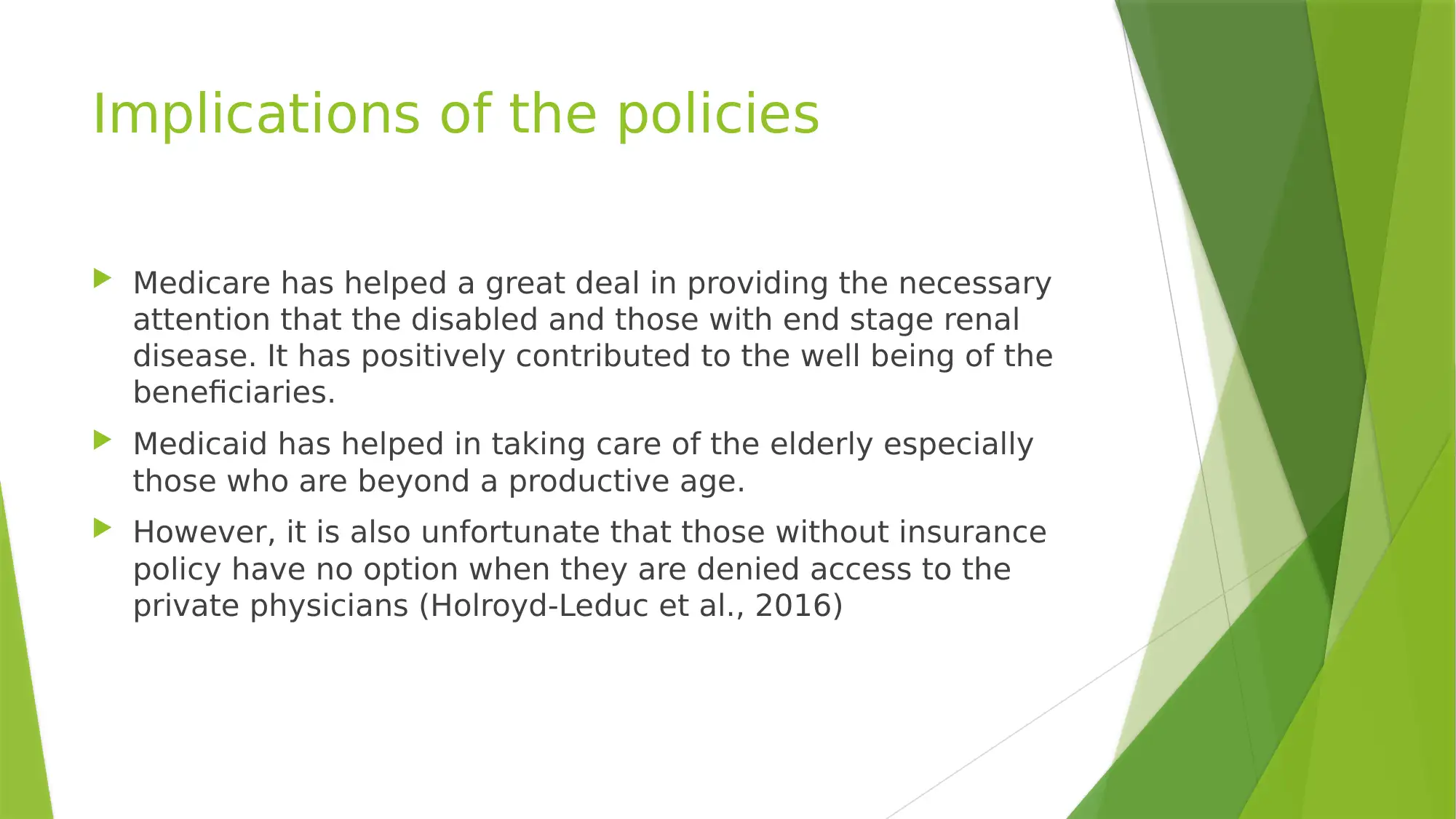
Implications of the policies
Medicare has helped a great deal in providing the necessary
attention that the disabled and those with end stage renal
disease. It has positively contributed to the well being of the
beneficiaries.
Medicaid has helped in taking care of the elderly especially
those who are beyond a productive age.
However, it is also unfortunate that those without insurance
policy have no option when they are denied access to the
private physicians (Holroyd-Leduc et al., 2016)
Medicare has helped a great deal in providing the necessary
attention that the disabled and those with end stage renal
disease. It has positively contributed to the well being of the
beneficiaries.
Medicaid has helped in taking care of the elderly especially
those who are beyond a productive age.
However, it is also unfortunate that those without insurance
policy have no option when they are denied access to the
private physicians (Holroyd-Leduc et al., 2016)
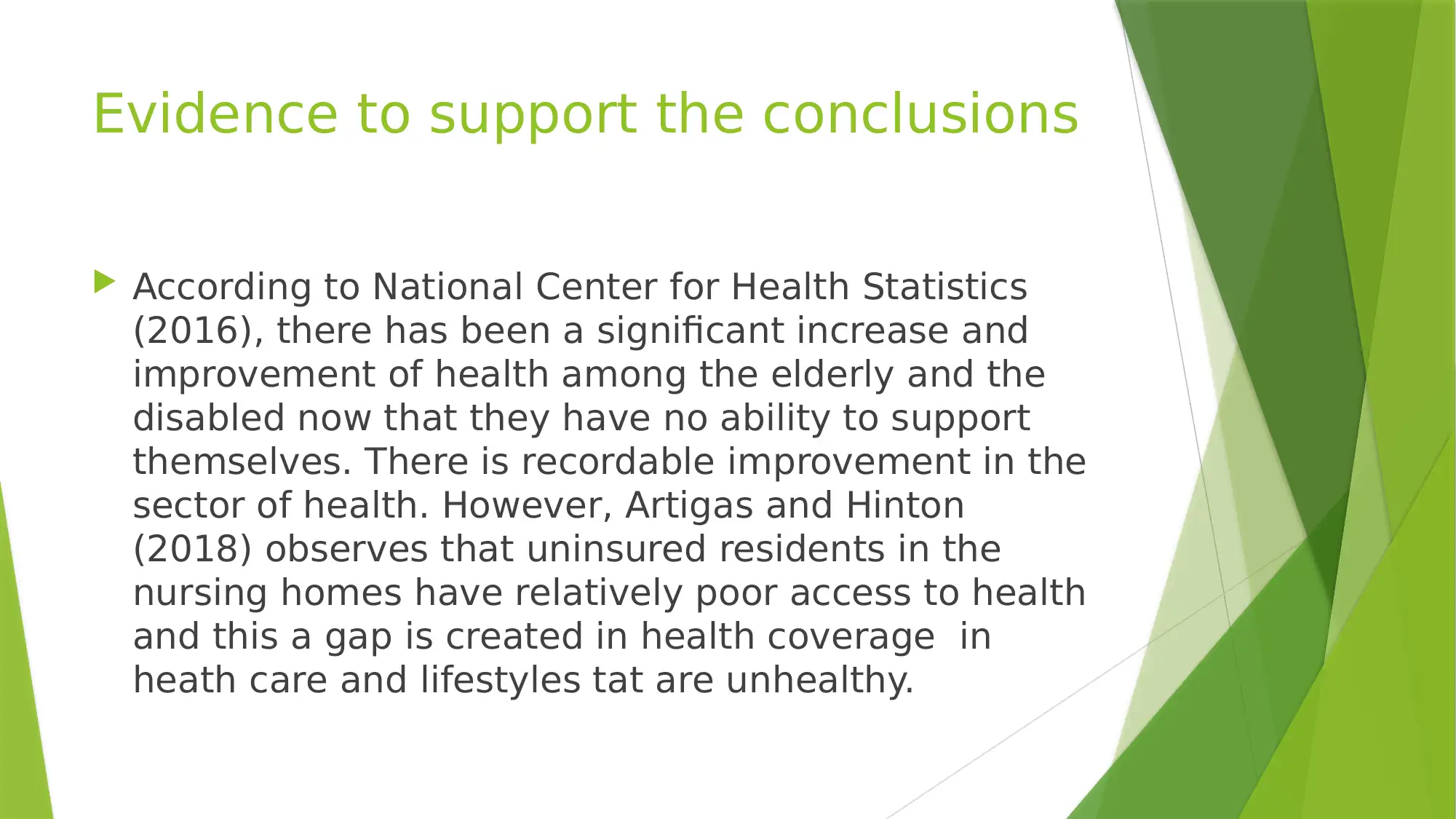
Evidence to support the conclusions
According to National Center for Health Statistics
(2016), there has been a significant increase and
improvement of health among the elderly and the
disabled now that they have no ability to support
themselves. There is recordable improvement in the
sector of health. However, Artigas and Hinton
(2018) observes that uninsured residents in the
nursing homes have relatively poor access to health
and this a gap is created in health coverage in
heath care and lifestyles tat are unhealthy.
According to National Center for Health Statistics
(2016), there has been a significant increase and
improvement of health among the elderly and the
disabled now that they have no ability to support
themselves. There is recordable improvement in the
sector of health. However, Artigas and Hinton
(2018) observes that uninsured residents in the
nursing homes have relatively poor access to health
and this a gap is created in health coverage in
heath care and lifestyles tat are unhealthy.
Paraphrase This Document
Need a fresh take? Get an instant paraphrase of this document with our AI Paraphraser
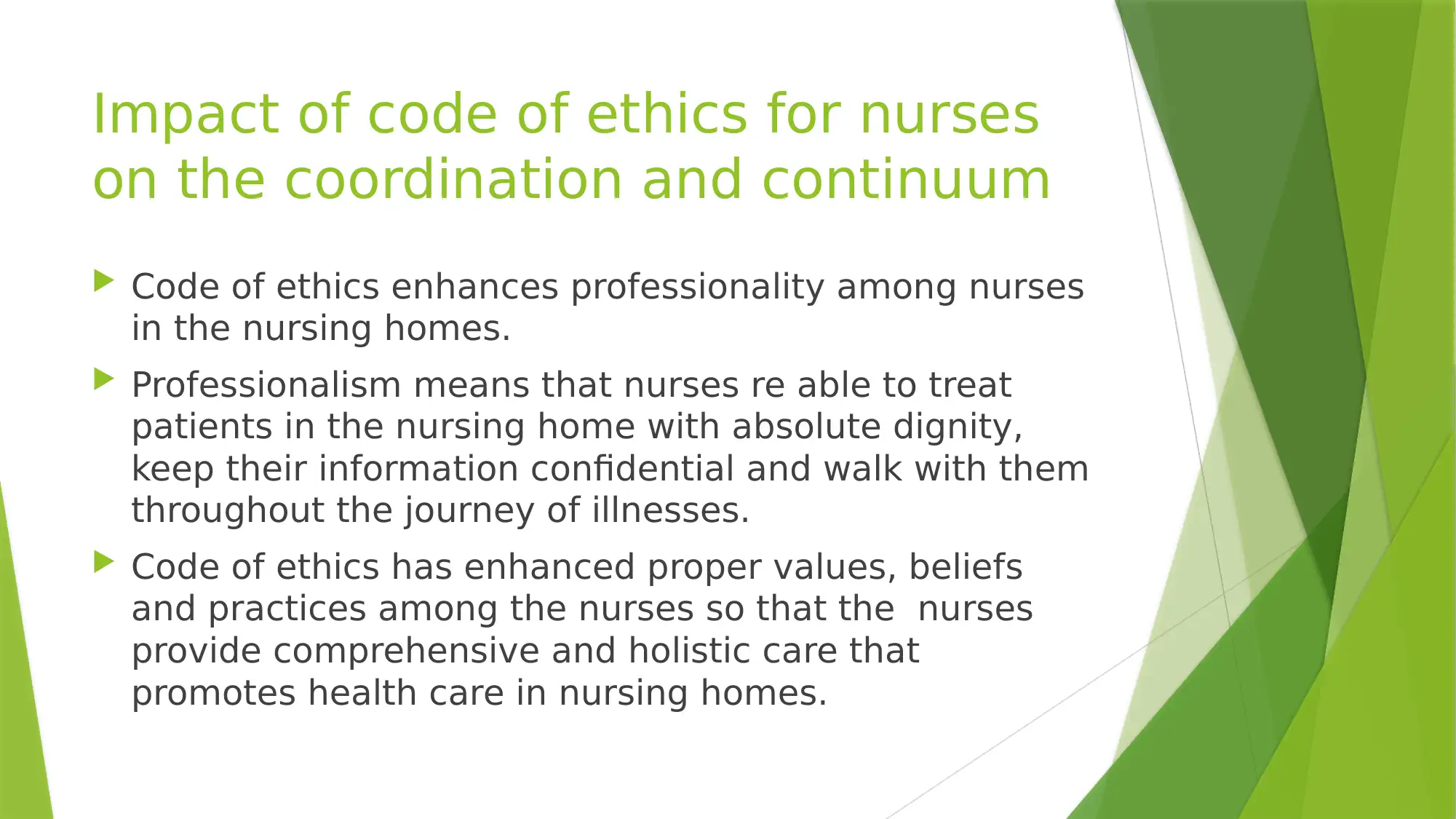
Impact of code of ethics for nurses
on the coordination and continuum
Code of ethics enhances professionality among nurses
in the nursing homes.
Professionalism means that nurses re able to treat
patients in the nursing home with absolute dignity,
keep their information confidential and walk with them
throughout the journey of illnesses.
Code of ethics has enhanced proper values, beliefs
and practices among the nurses so that the nurses
provide comprehensive and holistic care that
promotes health care in nursing homes.
on the coordination and continuum
Code of ethics enhances professionality among nurses
in the nursing homes.
Professionalism means that nurses re able to treat
patients in the nursing home with absolute dignity,
keep their information confidential and walk with them
throughout the journey of illnesses.
Code of ethics has enhanced proper values, beliefs
and practices among the nurses so that the nurses
provide comprehensive and holistic care that
promotes health care in nursing homes.
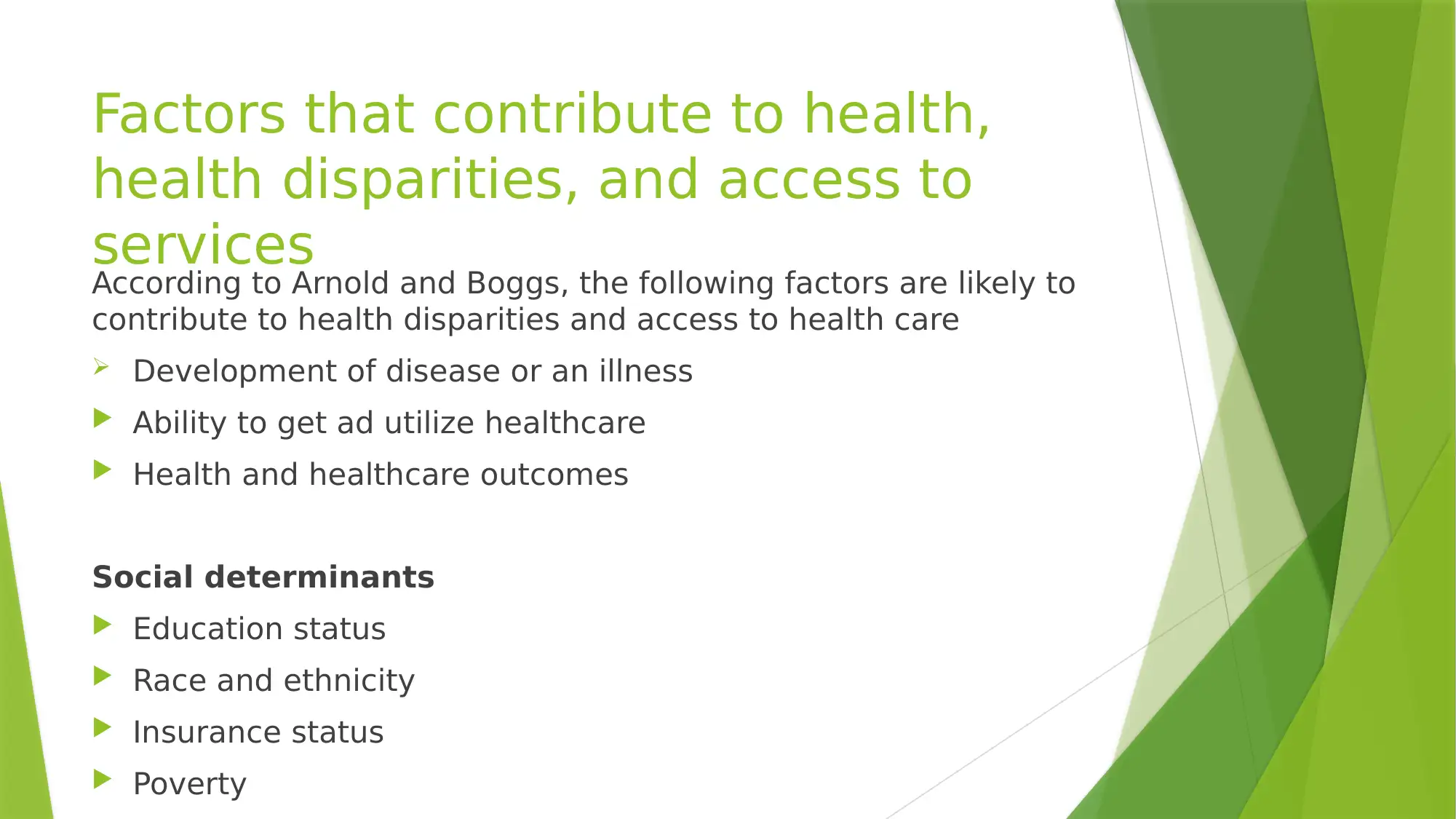
Factors that contribute to health,
health disparities, and access to
services
According to Arnold and Boggs, the following factors are likely to
contribute to health disparities and access to health care
Development of disease or an illness
Ability to get ad utilize healthcare
Health and healthcare outcomes
Social determinants
Education status
Race and ethnicity
Insurance status
Poverty
health disparities, and access to
services
According to Arnold and Boggs, the following factors are likely to
contribute to health disparities and access to health care
Development of disease or an illness
Ability to get ad utilize healthcare
Health and healthcare outcomes
Social determinants
Education status
Race and ethnicity
Insurance status
Poverty
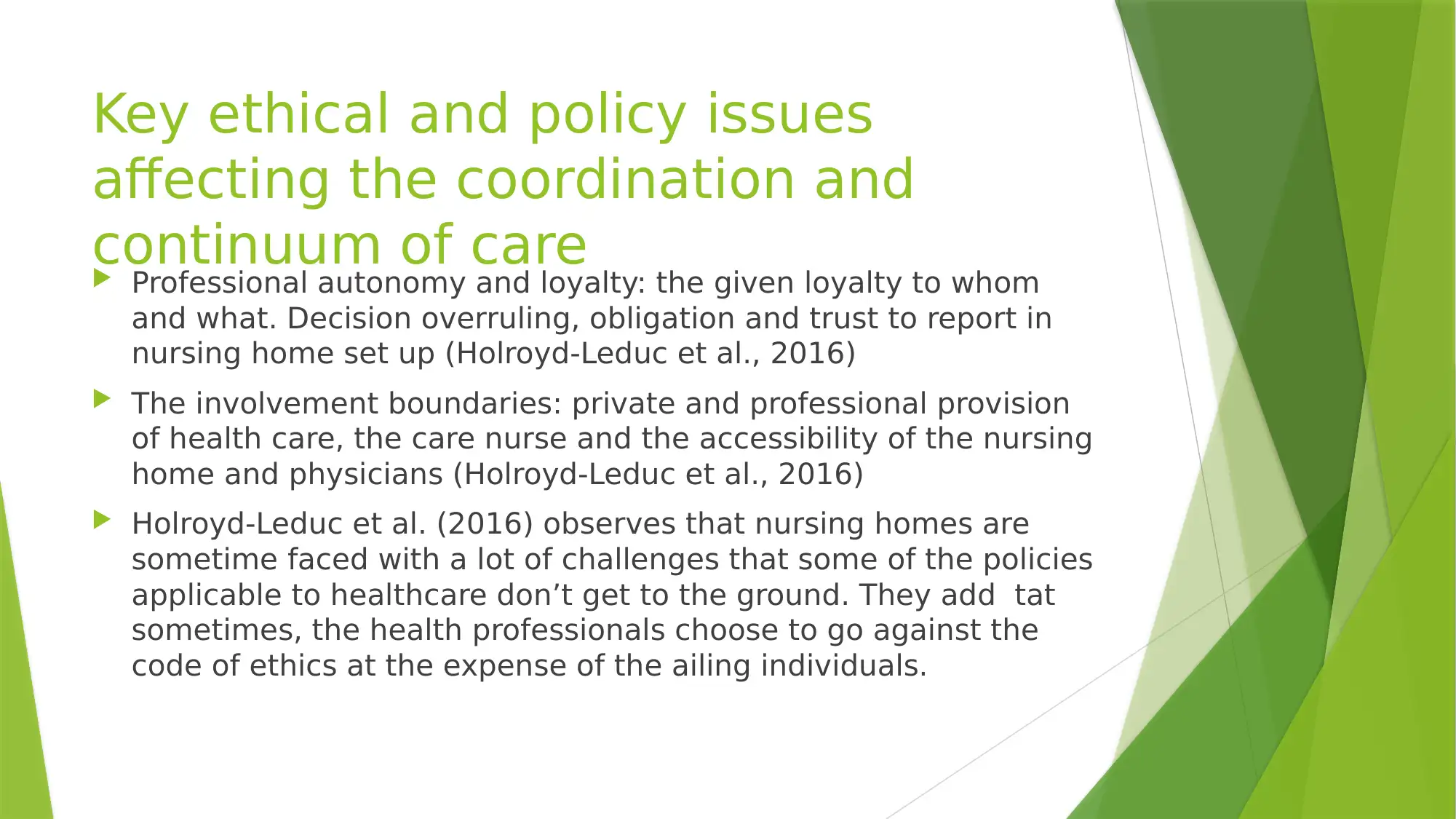
Key ethical and policy issues
affecting the coordination and
continuum of care Professional autonomy and loyalty: the given loyalty to whom
and what. Decision overruling, obligation and trust to report in
nursing home set up (Holroyd-Leduc et al., 2016)
The involvement boundaries: private and professional provision
of health care, the care nurse and the accessibility of the nursing
home and physicians (Holroyd-Leduc et al., 2016)
Holroyd-Leduc et al. (2016) observes that nursing homes are
sometime faced with a lot of challenges that some of the policies
applicable to healthcare don’t get to the ground. They add tat
sometimes, the health professionals choose to go against the
code of ethics at the expense of the ailing individuals.
affecting the coordination and
continuum of care Professional autonomy and loyalty: the given loyalty to whom
and what. Decision overruling, obligation and trust to report in
nursing home set up (Holroyd-Leduc et al., 2016)
The involvement boundaries: private and professional provision
of health care, the care nurse and the accessibility of the nursing
home and physicians (Holroyd-Leduc et al., 2016)
Holroyd-Leduc et al. (2016) observes that nursing homes are
sometime faced with a lot of challenges that some of the policies
applicable to healthcare don’t get to the ground. They add tat
sometimes, the health professionals choose to go against the
code of ethics at the expense of the ailing individuals.
Secure Best Marks with AI Grader
Need help grading? Try our AI Grader for instant feedback on your assignments.
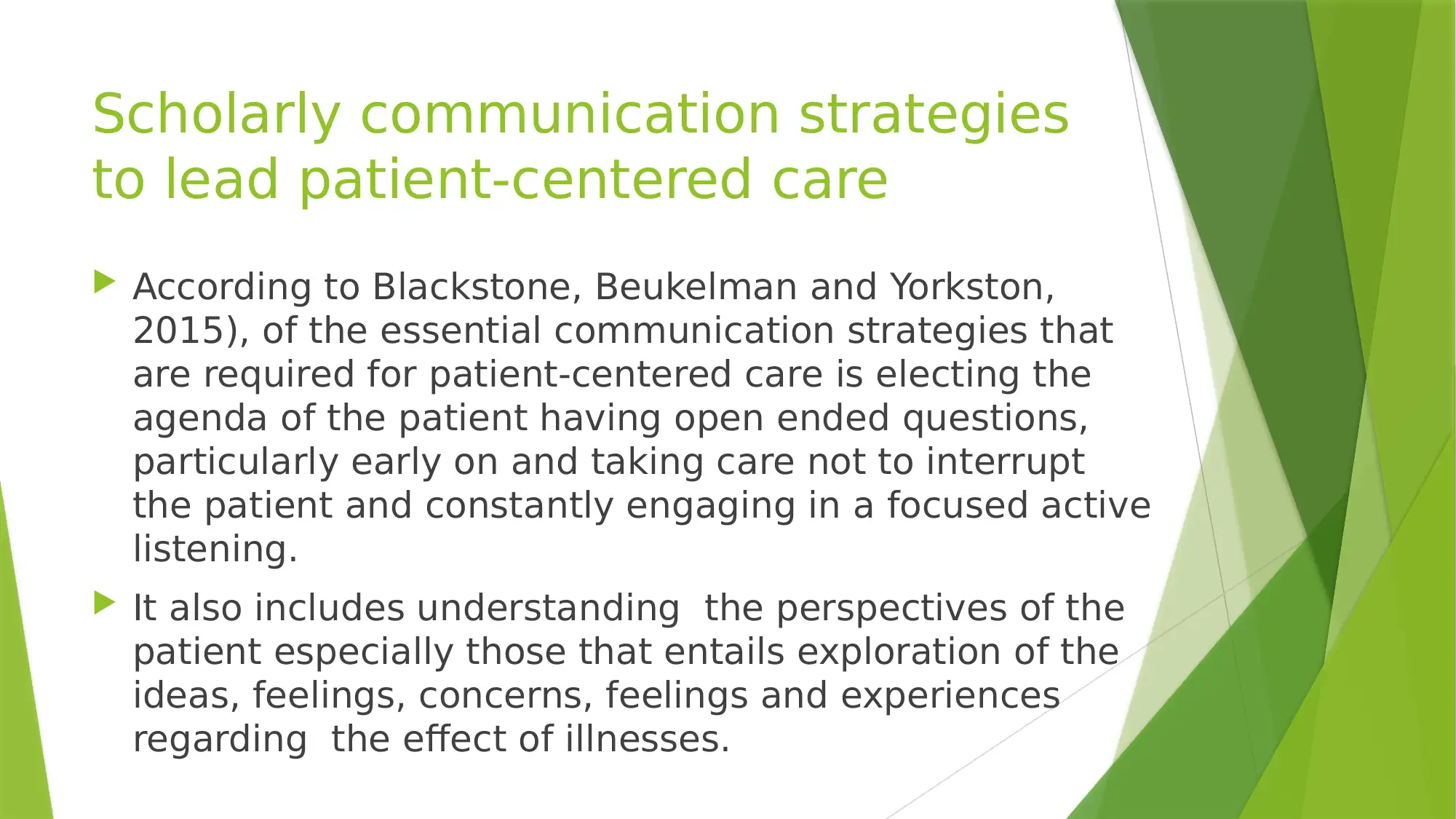
Scholarly communication strategies
to lead patient-centered care
According to Blackstone, Beukelman and Yorkston,
2015), of the essential communication strategies that
are required for patient-centered care is electing the
agenda of the patient having open ended questions,
particularly early on and taking care not to interrupt
the patient and constantly engaging in a focused active
listening.
It also includes understanding the perspectives of the
patient especially those that entails exploration of the
ideas, feelings, concerns, feelings and experiences
regarding the effect of illnesses.
to lead patient-centered care
According to Blackstone, Beukelman and Yorkston,
2015), of the essential communication strategies that
are required for patient-centered care is electing the
agenda of the patient having open ended questions,
particularly early on and taking care not to interrupt
the patient and constantly engaging in a focused active
listening.
It also includes understanding the perspectives of the
patient especially those that entails exploration of the
ideas, feelings, concerns, feelings and experiences
regarding the effect of illnesses.
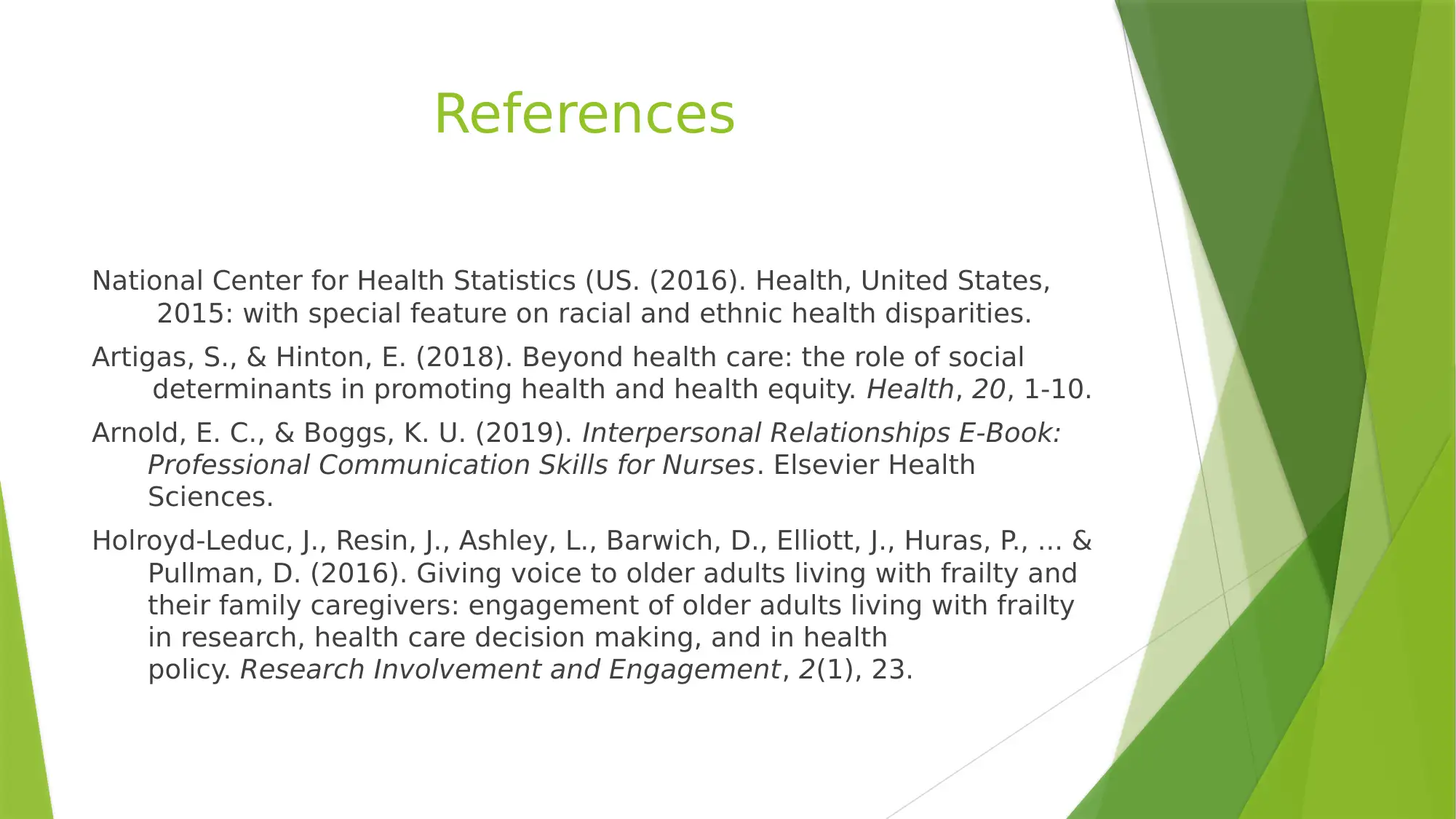
References
National Center for Health Statistics (US. (2016). Health, United States,
2015: with special feature on racial and ethnic health disparities.
Artigas, S., & Hinton, E. (2018). Beyond health care: the role of social
determinants in promoting health and health equity. Health, 20, 1-10.
Arnold, E. C., & Boggs, K. U. (2019). Interpersonal Relationships E-Book:
Professional Communication Skills for Nurses. Elsevier Health
Sciences.
Holroyd-Leduc, J., Resin, J., Ashley, L., Barwich, D., Elliott, J., Huras, P., ... &
Pullman, D. (2016). Giving voice to older adults living with frailty and
their family caregivers: engagement of older adults living with frailty
in research, health care decision making, and in health
policy. Research Involvement and Engagement, 2(1), 23.
National Center for Health Statistics (US. (2016). Health, United States,
2015: with special feature on racial and ethnic health disparities.
Artigas, S., & Hinton, E. (2018). Beyond health care: the role of social
determinants in promoting health and health equity. Health, 20, 1-10.
Arnold, E. C., & Boggs, K. U. (2019). Interpersonal Relationships E-Book:
Professional Communication Skills for Nurses. Elsevier Health
Sciences.
Holroyd-Leduc, J., Resin, J., Ashley, L., Barwich, D., Elliott, J., Huras, P., ... &
Pullman, D. (2016). Giving voice to older adults living with frailty and
their family caregivers: engagement of older adults living with frailty
in research, health care decision making, and in health
policy. Research Involvement and Engagement, 2(1), 23.
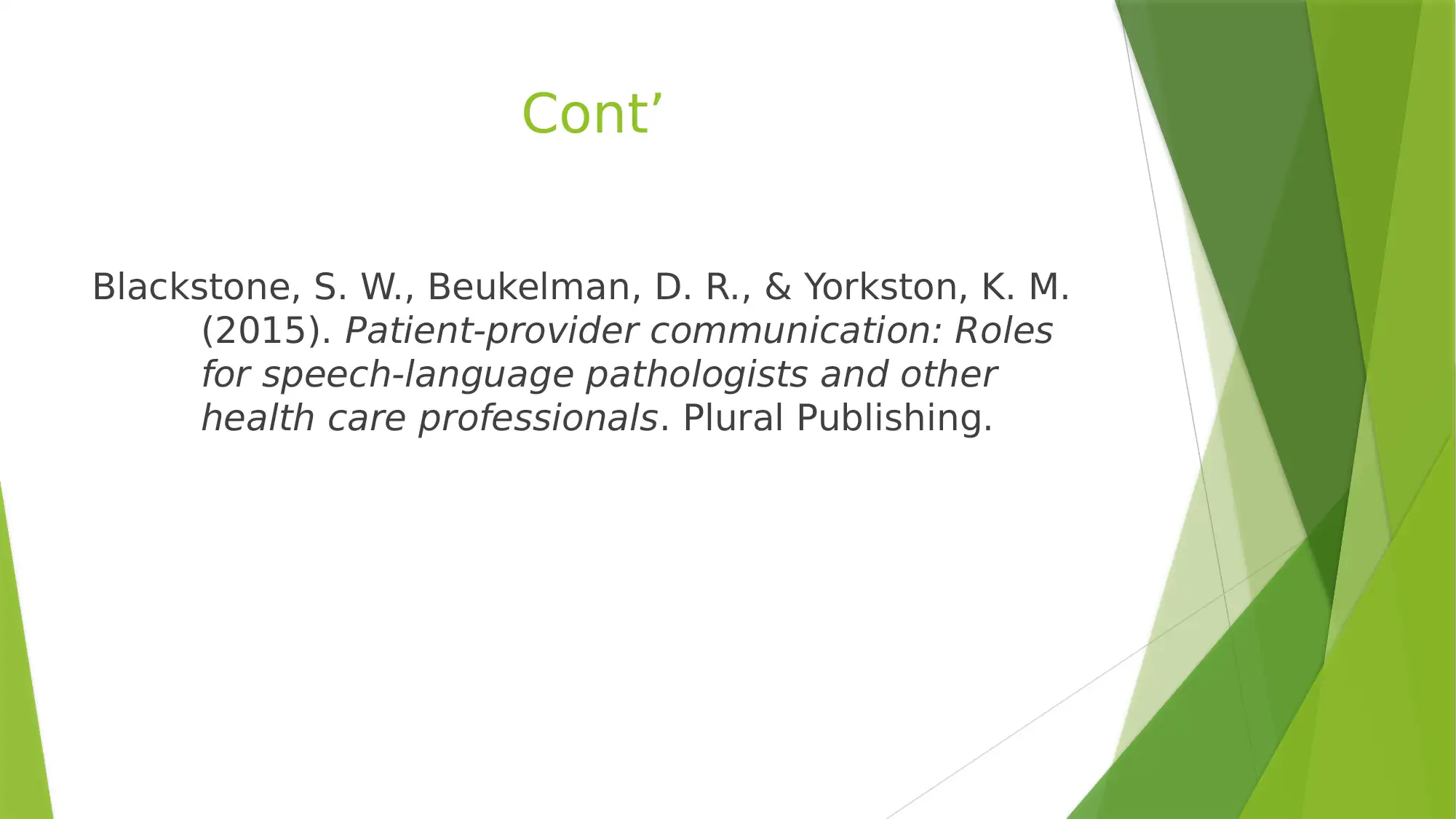
Cont’
Blackstone, S. W., Beukelman, D. R., & Yorkston, K. M.
(2015). Patient-provider communication: Roles
for speech-language pathologists and other
health care professionals. Plural Publishing.
Blackstone, S. W., Beukelman, D. R., & Yorkston, K. M.
(2015). Patient-provider communication: Roles
for speech-language pathologists and other
health care professionals. Plural Publishing.
1 out of 13
Related Documents
Your All-in-One AI-Powered Toolkit for Academic Success.
+13062052269
info@desklib.com
Available 24*7 on WhatsApp / Email
![[object Object]](/_next/static/media/star-bottom.7253800d.svg)
Unlock your academic potential
© 2024 | Zucol Services PVT LTD | All rights reserved.





